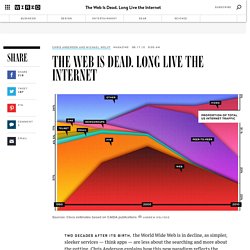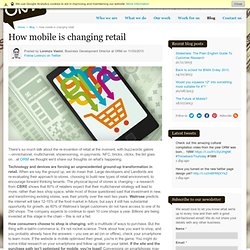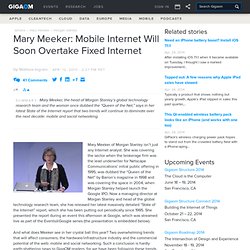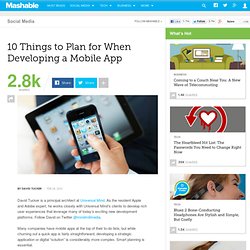

The Web Is Dead. Long Live the Internet. Two decades after its birth, the World Wide Web is in decline, as simpler, sleeker services — think apps — are less about the searching and more about the getting.

Chris Anderson explains how this new paradigm reflects the inevitable course of capitalism. And Michael Wolff explains why the new breed of media titan is forsaking the Web for more promising (and profitable) pastures. Who’s to Blame: Us As much as we love the open, unfettered Web, we’re abandoning it for simpler, sleeker services that just work. by Chris Anderson You wake up and check your email on your bedside iPad — that’s one app. You’ve spent the day on the Internet — but not on the Web. This is not a trivial distinction. How mobile is changing retail. There's so much talk about the re-invention of retail at the moment, with buzzwords galore – omnichannel, multichannel, showrooming, m-payments, NFC, bricks, clicks, the list goes on…at ORM we thought we'd share our thoughts on what's happening.

Technology and devices are forcing an unprecedented ground-up transformation in retail. When we say the ground up, we do mean that. Large developers and Landlords are re-evaluating their approach to stores, choosing to build new types of retail environment, to encourage forward thinking tenants. The physical layout of stores is changing – a research from CBRE shows that 60% of retailers expect that their multichannel strategy will lead to more, rather than less shop space, while most of those questioned said that investment in new, and transforming existing stores, was their priority over the next two years.
How consumers choose to shop is changing, with a multitude of ways to purchase. Make sure your emails are mobile optimised too. Mary Meeker: Mobile Internet Will Soon Overtake Fixed Internet. Mary Meeker of Morgan Stanley isn’t just any Internet analyst.

She was covering the sector when the brokerage firm was the lead underwriter for Netscape Communications’ initial public offering in 1995, was dubbed the “Queen of the Net” by Barron’s magazine in 1998 and was covering the space in 2004, when Morgan Stanley helped launch the Google IPO. Now a managing director at Morgan Stanley and head of the global technology research team, she has released her latest massively detailed “State of the Internet” report, which she has been putting out periodically since 1995.
She presented the report during an event this afternoon at Google, which was streamed live as part of the Events@Google series (the presentation is embedded below). And what does Meeker see in her crystal ball this year? Two overwhelming trends that will affect consumers, the hardware/infrastructure industry and the commercial potential of the web: mobile and social networking. Mary Meeker’s presentation: 10 Things to Plan for Mobile App Dev. David Tucker is a principal architect at Universal Mind.

As the resident Apple and Adobe expert, he works closely with Universal Mind’s clients to develop rich user experiences that leverage many of today’s exciting new development platforms. Follow David on Twitter @mindmillmedia. Many companies have mobile apps at the top of their to-do lists, but while churning out a quick app is fairly straightforward, developing a strategic application or digital “solution” is considerably more complex. Smart planning is essential. Here are 10 things to consider before developing your app. 1. When developing a digital solution strategy, first examine your organization’s goals for the program. 2. The next step is to understand who your target users are, their goals and requirements, and the technologies they use. 3. Spending time with your target users is the only way to ensure you really understand what they are looking for in a mobile application. 4.
Don't try to tackle the whole problem at once. 6 Tools to Build a Mobile App on the Cheap. The Mobile App Trends Series is presented by Sourcebits, a leading product developer for mobile platforms. Sourcebits offers design and development services for iOS, Android, Mobile and Web platforms. Follow Sourcebits on Twitter for recent news and updates. The massive growth of the app market has coincided with the creation of a parallel niche industry — the proliferation of accessible, low-cost development alternatives to traditional shops and agencies. But not all brands — or industries altogether — require diverse, expansive functionality in their apps. In the same regard, a lean approach to launch can move a unique product to market in a mere matter of minutes. As the mobile applications market moves toward $25 billion per year, according to a MarketsandMarkets report, non-traditional development opportunities are emerging in a number of forms. Below are six platforms carving out their space in the market. 1. 2. 3.
Cost: Licenses start at $2,500 per month.